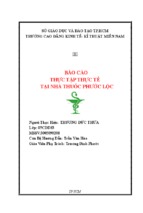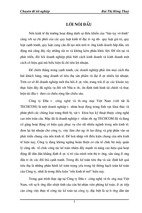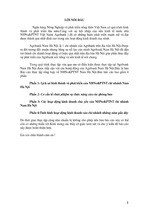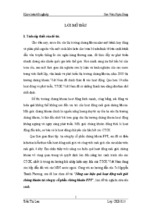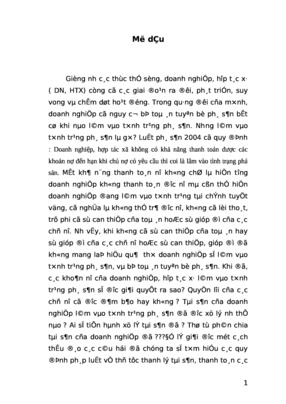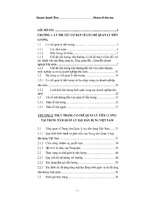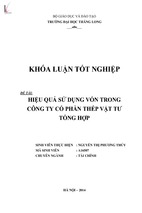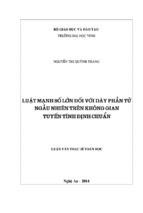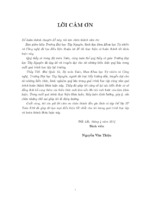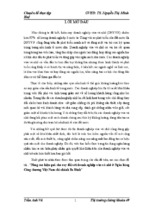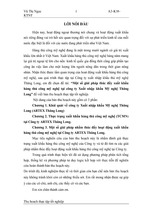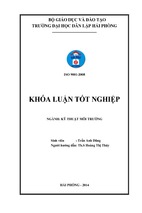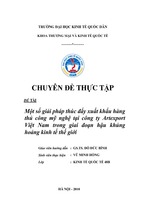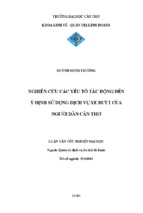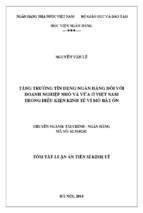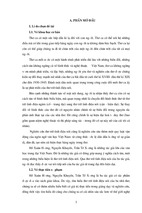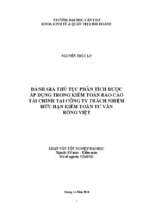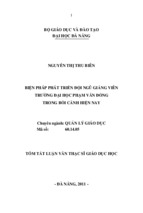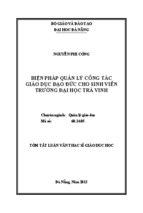MINISTRY OF EDUCATION AND TRAINING
MINISTRY OF JUSTICE
HANOI LAW UNIVERSITY
TRAN THI BAO ANH
THE LAW ON ENTERPRISE ACQUISITION
IN VIETNAM
Field of Study : Economic Law
Code
: 62 38 01 07
ABSTRACT OF DOCTORAL THESIS ON LAW STUDIES
HANOI - 2014
Training instituation:
HANOI LAW UNIVERSITY
Supervisor:
1. Assoc. Prof. Dr. Nguyen Viet Ty
2. Dr. Phan Chi Hieu
Opponent 1: Prof. Dr. Le Hong Hanh
Opponent 2: Assoc. Prof. Duong Dang Hue
Opponent 3: Assoc. Prof. Dr. Nguyen Minh Man
This thesis will be defended before the University Thesis Evaluation Board at
Hanoi Law University on
This thesis can be studied more at:
1) National Library of Vietnam;
2) Library of Hanoi Law University;
, dated / /2014
INTRODUCTION
1. The urgency of the topic
The terms “Merger and Acquisition” (abbreviated as M & A) means that
merging and acquisition of (or trading) businesses, which are the activities to gain
control, to dominate partly or entirely business operations of enterprises through
owning a portion or the entire enterprise.
M & A has drawn the attention of investors, scientists in economic and legal
fields by the popularity and the various impacts to the entire world economy. M &
A is reviewed under two main angles which are economic perspective as a problem
of business finance and corporate strategic management, and legal perspective as
the object of a legal framework for the implementation of M & A. The author of
the thesis has selected one of the two activities of M & A which is acquisition or
enterprise trading as the research topic for the jurisprudential thesis originated from
the following basic reasons:
First, the scientists have mainly studied M & A in term of economic angle,
very few have the legal scientific works on M & A in general and on Acquisition
in particular. In Vietnam, the legal provisions on mergers have been relatively
clear, while the laws on acquisitions have been inconsistent, have lacked
comprehensiveness. Most studies on acquisitions under narrow perspective as
business trading (not involved in researches on purchases and sales of private
enterprises, cooperatives) or studies on business trading contracts in the workshop
articles have not evaluated the overall legislation on acquisitions. For that reason,
there should be legal scientific works with more intensive research on acquisitions.
Therefore, research the law on acquisitions has suggested a topic idea for the
student to develop into the jurisprudential doctor dissertation.
Second, in view of competition, acquisition is understood as acts of
economic concentration associated with the process by which the number of
competitive-free independent businesses in the market has been reduced through
the acts of merger, consolidation, acquisition, joint-ventures, and other behaviors
of economic concentration. Karl Marx discovered a law full of paradox:
Competition leads to economic concentration but economic concentration to a
certain level destroys competition and forces the State to adjust law to economic
concentration. For that reason, there should be a jurisprudential research on
assessing the situation of law and competition law enforcement to control the
business acquisitions in order to protect competition in the market and general
welfare of the society.
For all the above-mentioned reasons, I have selected “THE LAW ON ENTERPRISE
ACQUISITION IN VIETNAM” as my doctoral thesis topic.
2. The object and scope of the dissertation research
The object of the thesis research is the present activities of acquisitions in
Vietnam.
The scope of the thesis research: As a jurisprudential doctoral thesis, it
emphasizes on the research of acquisitions in terms of legal science. The
dissertation only focuses on analyzing acquisition research without consolidation
or merger activities.
Seen from legal perspective, acquisition is a complex investment operation,
involving in many different issues such as contract law, securities law, corporate
law, competition law, labor law, land law, environment law, financial law, law on
intellectual property etc. The thesis does not analyze all the law related to
acquisition. It does not in-depth study the after-trading procedures such as tax
procedures, business transformation process. It nor have the analysis on state
management for acquisition activity (in aspects of competition law, securities law)
and the law on the settlement of disputes arising from business purchasing and
selling operation. Buying and selling businesses is a topic research with very wide
content and quite complicated. However, in terms of a doctoral thesis, it focuses
within the following scope:
Research on acquisitions in Vietnam with the nature of the investment is to
gain ownership and control of enterprises with the following specific content:
subjects of acquisitions, trading object is a part or whole of the business,
acquisition forms, acquisition procedures, control of acquisitions from the
perspective of competition law. In practice, acquisitions are shown through many
different diverse forms. Within the limit of the jurisprudential doctoral thesis,
acquisition is studied under the form of the business holders to transfer all shares,
the dominated capital to the purchaser. Therefore, the forms of increasing charter
capital of enterprises and the shareholders contributed to the charter capital for the
purpose of governing and controlling business activities of enterprises are excluded
from the scope of the dissertation research.
3. The purpose and tasks of the thesis research
The purpose of the thesis:
The purpose of the thesis is to study acquisition activity under legal
perspective and build a number of solutions to complete the law on acquisitions in
Vietnam.
To achieve this purpose, the thesis poses the following basic tasks:
- Analyze the theoretical basis of acquisition activity by clarifying the concept
of acquisition in a number of countries and that in Vietnam; clarify the
features of acquisitions in comparison with some other legal relations;
analyze the basic contents of the law on acquisition. During analysis, the
trading activities are considered under the comparable view with the
provisions of a number of countries around the world in order to give a
richer and more systematic as well as more comprehensive view on this
activity.
- Look at the provisions of the existing laws on acquisition activity, indicating
the existence of the inadequacies of the legal system on acquisitions and
analyzing, giving comments on the experiences of regulating laws on
acquisitions in several countries. Analyze and evaluate the operating
acquisitions as the basis for proposed solutions accordingly.
- Propose measures to improve the law on acquisitions in Vietnam in the
current period.
4. The methodology and the research method of the thesis
The thesis is formed on the basis of the methodology of Marxism –
Leninism, Ho Chi Minh Ideology and the perspective of the Communist Party
about State and Law. The methodological basis of the dissertation is dialectical
materialism and historical materialism.
To solve the problems posed in the tasks of the research topic, different
research methods such as analysis, synthesis, and jurisprudential comparison are
used in combination.
5. New features and significance of the thesis
The thesis has achieved the following new findings:
- The thesis analyzes the concept of buying and selling businesses in the
world, from which builds a concept of trading businesses in Vietnam;
pointing out the basic legal characteristics of acquisitions versus asset
trading, business leasing, donating, merging, share transfer, or capital share.
- The thesis builds scientific theoretical system of laws on acquisitions in
Vietnam. It is expressed through the construction of concepts, clear
identification of the content of laws on acquisitions including norms of
acquisition forms, subjects of acquisition, acquisition contract, the
procedures, and control of business trading under the adjustment of
competition law.
- The thesis is the first scientific research work which comprehensively and
systematically evaluates the current status of legislation on acquisitions in
Vietnam, pointing out the inadequacies of existing laws on acquisitions.
Simultaneously, it analyzes and reviews international experiences in
regulating laws on business trading activities. This is one of the important
foundations for reference in the process of finalizing legislations on
acquisitions.
- The dissertation sets out specific solutions to improve the law on
acquisitions with a view to meeting the need of developing enterprise trading
activities in the market economy, especially in the trend of international
economic integration.
6. The structure of the thesis
Apart from the Preamble, the overview of the situation of the thesis research,
conclusion, list of references, the dissertation includes three chapters, concretely as
follows:
Chapter 1: The theoretical issues of acquisitions and legislation on
acquisitions.
Chapter 2: The current status of legislation on acquisitions in Vietnam.
Chapter 3: The demands and solutions to complete the laws on acquisitions
in Vietnam.
THE OVERVIEW OF THE SITUATION OF
THE THESIS RESEARCH
There are many scientific works from law textbooks, reference books,
dissertations, essays, journal articles to presentations at the workshops studying on
acquisitions. It can be typically told as follows:
M&A Mergers & Acquisition Basics The Key Steps of Acquisition,
Divestitures, and Investments by author Michael E.S. Frankel, Knowledge
Publishing House, Hanoi (2009); Mergers and Acquisitions from A to Z by
Andrew J.Sherman, Milledge A. Hart, Knowledge Publishing House, Hanoi
(2009); Intelligent M&A: Navigating the Mergers and Acquisitions Minefield by
Scott Moeller, Chris Brady, Knowledge Publishing House, Hanoi (2009); Issues to
Consider When Embarking on M & A Transactions in Vietnam by Gregory Crovo,
Partner (Foreign Lawyer), Kelvin China Partnership; Report on Economic
Concentration in Vietnam – Current Status and Forecast (2012), Competition
Management Department, Ministry of Industry and Trade, Hanoi; Scientific
Research: A handbook for Mergers and Acquisitions in Vietnam by Vietnam
Mergers and Acquisitions Network (2009); Ministry-level scientific research
project: Mergers and Acquisitions Activity – The Rationale, international
experience, and recommended policy for Vietnam (2009), Central economic
management research Institute; Ministry-level scientific research project: The
legislations in governing mergers and acquisitions in Vietnam – scientific
workshop proceedings of laws on mergers and acquisitions: Theoretical and
practical issues organized and chaired by Ho Chi Minh Law University (2010);
Monographs: Laws on contracts in commerce and investment – The basic legal
issues, National Political Publishing House, Hanoi edited by Dr. Nguyen Thi Dung
in 2009 etc.
In different facets, the study of corporate trading activity has been
mentioned by the above authors, however, it has just stopped at each specific
content without comprehensively and deeply addressing all aspects of acquisition
activity. Therefore, an in-depth study with fuller, more comprehensive and
systematic content on acquisitions in Vietnam in the current period is absolutely
necessary.
The author evaluates legislation on acquisitions in two perspectives: (i)
acquisition is business freedom, so the thesis specifies a legal framework for
implementing acquisition procedures; (ii) acquisitions under adjustment of
competition law, the contents of the Report on Vietnam economic concentration in
2012 are used for reference by the author to give personal statements in order to
complete the law on acquisitions in Vietnam. The thesis analyzes to identify
acquisition relations on the basis of evaluating the research content of M & A in
conjunction with the analysis of legal regulations on acquisitions, regulations on M
& A of several countries. This is the thesis’ new approach to acquisitions that is
different from other foreign and local authors’ scientific works.
Chapter 1
THE THEORETICAL ISSUES ON
ACQUISITIONS AND LEGISLATIONS ON
ACQUISITIONS
1.1.
An overview of acquisition
1.1.1. Concept of acquisition
Based on the analysis of interpretation of acquisition in a number of
countries and the provisions of the Competition Act (2004), Corporate Law
(2005), the thesis puts forward the concept of acquisition as follows:
Acquisition is a corporate action in which the business owner transfers the
entire capital or contributed stakes, controlling shares to the transferee. The
transferee has the ownership of the whole or a part of the enterprise and
control over the business operations of the acquired enterprise.
1.1.2. Characteristics of acquisition
First, the object of trading relationship is business with the nature of special
“commodity” in acquisition relationship.
Second, the consequence of the acquisition is the purchaser to take control of
operations of the target business.
Third, the subject who has the right to sell the business must be the business
owner, the purchase subjects should be the organizations or individuals who
wish and have the right to purchase enterprises.
Fourth, the legal forms which recognize acquisition relationships are
enterprise sale contracts, share transfer agreement, the dominant stake
(generally referred to as acquisition contracts).
Fifth, acquisition must be allowed or recognized, controlled by State
agencies under certain legal procedures.
1.1.3. Differentiate acquisition with some other legal relations.
Discriminate acquisition with business leasing, donation, leveraged buyout.
Acquisition is different from business leasing. In the relation of leasing
business, the lessor does not transfer the business ownership to the lessee.
The lessee only has the right of managing and operating the business under
agreement in the lease contract and regulations of the relevant law.
Acquisition is different from business donation. In the relation of
acquisition, the seller transfers the enterprise ownership to the purchaser,
and the purchaser is obliged to pay the seller (with compensation). For
business donation, the donor transfer the enterprise ownership to the done
without compensation requirements; the donee agrees to take over the
business without payment. Acquisition is different from leveraged buyouts
because acquisition means the business ownership is transferred to the
purchaser but a leveraged buyout only changes the creditor, not the owner of
the business. The exception in which a leverage buyout becomes an
acquisition happens when the creditor and the owner of the business change
the debt into the equity capital.
Distinguish acquisitions and business asset purchases
First, the objects of acquisitions and business asset purchases are different.
The object of asset purchases and sales is the assets of the target enterprise.
Buying and selling the business assets only change the ownership of some
certain assets from the seller to the purchaser. The objects of acquisition are
enterprises.
Second, the asset salesperson is different from the subject who has the right
to sell the business.
Businesses are only the objects of acquisitions, they are not able to sell
themselves. Therefore, the subject who has the right to sell the business is
the owner of that business. Unlike acquisitions, according to the general
theory of the right of property owners to the assets, the subject who has the
right to sell the assets of the enterprise is the business.
Differentiate acquisitions with mergers
The objects of acquisitions and mergers are different. Acquisition means the
ownership of the entire or partial target business is transferred to the
purchaser. While merger is the transfer of all assets, rights, obligations, and
legal interests of the merged enterprise to the merging business.
The legal consequences after mergers and after acquisitions are different.
The merged enterprise ceases existing after the merger. Unlike corporate
merger, the target business in the acquisition transaction still exists before,
during, and after the purchase process.
Distinguish acquisitions and other forms of financial investment through
the transfer of shares, stakes of members and shareholders of the
company.
It is considered acquisitions only when the transfer of stakes leads to the
consequence that the transferee of stakes and capital shares can control and
govern the operations of the target business.
1.1.4.
The impacts of acquisitions
on the business seller, buyer, and on social economy
The thesis has evaluated the different impacts of acquisitions on social
economy, including the positive effects on increasing economic benefits
derived from the implementation of corporate acquisition deals. At the same
time, the thesis also examines acquisitions under the competition aspect and
sees that acquisition is a economic concentration, is the “gateway” leading to
the formation of enterprises with market power and may negatively
influence on the market competition.
1.2.
Legislations on acquisitions
1.2.1. Legal concept on acquisitions
Acquisition is complex. It
covers all the issues of property, capital, market, brand, management structure,
personnel, culture etc. Acquisition is studied under the economic, financial, and
legal perspectives. The research contents of acquisitions are different due to the
different approaches at different angles. Acquisition law can be interpreted in
broad sense and narrow sense.
In broad terms: Acquisition law is a combination of many legal norms under
different law fields, regulates social relations arising in the process of
conducting acquisitions.
In narrow terms: Legislation on acquisition is a system of legal norms which
directly adjusts social relations arising between the buyers and the sellers of
the businesses during the acquisition contract signing process, and the
relation between the authorized state and the enterprise to register to change
the business owners or to implement State control on economic
concentration.
Legislation on acquisition in the narrow sense includes specific provisions to
directly adjust the relationship between the parties involving in acquisition
deal. Specifically, the legislation on acquisition in the narrow sense with
internal content: regulations on forms of acquisitions, regulations on subjects
as enterprise seller and buyer; regulations on acquisition contracts;
regulations on acquisition procedures; provisions on business control under
the competition law perspective.
1.2.2. Law content on acquisitions
The content of law on acquisitions is understood in a narrow sense as
described in the above subsection 1.2.1 consists of the following specific
rules: Regulations on forms of acquisitions; Provisions on subjects of
acquisitions; Legal rules on contracts – the method to implement acquisition
transactions; and legal regulations on acquisition procedures.
Chapter 1 Conclusion
1. Acquisition not only changes the status of business ownership but also the
enterprise operating management activities.
2. The objects of acquisition are enterprises. The enterprise which is the subject of
acquisition should maintain legal status after acquisition transaction and only
change the business owner.
3. Acquisition forms in Vietnam include: (i) entire acquisition shown by the owner
of the business transfer the entire stakes and shares to the purchaser; (ii) partial
acquisition implemented by the owner assigns the dominant stakes to the assignee
to take control of the business operations. The ratio of dominant stakes to get
control of the business operations are prescribed in legal documents or regulated in
The business Charter of the acquired enterprise.
4. The thesis studies the provisions of the law on acquisitions in Vietnam in the
narrow sense. Accordingly, the legislation on acquisition is a system of conduct
rules issued or recognized by the State, directly adjusts social relations arising
between buyers and sellers during the signing contract process and the relation
between authorized state agencies and enterprises in registering to change the
business owners or to implement state control in economic concentration.
CHAPTER 2
LEGAL STATUS ON ACQUISITIONS IN
VIETNAM
2.1. Regulations on acquisition forms
2.1.1. Entire business acquisition
Purchase the entire business means the purchaser is transferred the ownership of
the entire business by the owner of the enterprise. The entire business acquisition
form include as follows: private business acquisition, the assignation of all the
stakes and shares to the assignee. The buyer of the private enterprise and the
transferee of the stakes and shares should register to change the owner of the
business according to the regulated law. The legal basis for implementation of
entire business acquisition is prescribed in corporate law, securities law, and
investment law.
In a number of areas related to economic security, the acquisition legislation may
be different from the nature of the acquisitions in other areas, such as the State will
limit the forms of acquisitions, strictly control the procedures on the acquisition of
credit organizations etc. The reasons that the State develops legal regulations to
govern the acquisition activities in some specific areas such as acquisitions of
credit institutions are in order to stabilize the national economy in the recession
time or to restrict the negative impacts of the market economy on the social
economy.
2.1.2. Partial business acquisition
Partial business acquisition means the owner of the enterprise transfer the
ownership of a part of the business to the buyer so that the buyer can control the
target enterprise. This form includes: members and shareholders of the company
transfer the stakes and dominant shares (generally called as the dominant stakes) to
the assignee so that the person can take control of the operations of the target
business. The proportion of the dominant stakes is regulated in law or prescribed in
the business charter. The buyer now becomes the co-owners of the business and
must perform registration procedures to change the ownership as prescribed by
law. The legal basis for implementation of partial business acquisition is prescribed
in corporate law, securities law, and investment law.
Purchasing branches or the dependent accounting unit of the enterprise is not
acquisition because: (i) the dependent accounting units, the subordinate units of the
enterprise do not have the legal status, is not an independent legal entity, not a
business; (ii) On the balance sheet of the business, the subsidiaries and the
dependent accounting units are not shown as assets of the business.
Partial business purchases can be considered as acquisition in some cases depends
on the legal form of the business department.
2.1.3. Business asset acquisition
Section 3 of Article 17 in Competition Law (2004) states: Acquisition means a
business purchases the entire of a part of the assets of another enterprise sufficient
to take control and dominate the entire or an industry of the acquired business. The
approach of the Competition Law and the instruction decrees on acquisition case is
not suitable with the theory of enterprises in Vietnam. Under the general principles
to form as a business owner, the investor must contribute to the charter capital of
the enterprise. For the businesses existing under the legal forms as companies, they
must determine the stakes of the company owners and clearly stated in the Charter.
In acquisition, to form as a business owner, the purchaser must “buy” the
ownership of the business by buying the contributed stakes of the owner of the
business. Purchasing the stakes of the business owner is absolutely different from
buying assets of the business because asset purchasing only makes the purchaser
become the owner of the acquired property, not the owner of the target business.
2.2. Regulations on the subjects of acquisitions
2.2.1. The selling party
As a general rule, who is now the owner, that person may decide to sell the
business. Depending on the type of business that the owner may be an individual or
a legal entity or many individuals and organizations with legal status.
2.2.2. The buying party
The buying party might be an organization or an individual wishing to purchase the
enterprise and meet the enterprise and meet the conditions prescribed by law.
Depending on the type of the business or the purpose of adjustment of the legal
documents, the conditions on the subjects having the right of buying the business
can be different.
For not 100% state-owned enterprises, there is no law specifying the objects
having the right of buying businesses. So, a question arises: do the objects without
the right of founding, managing businesses in Vietnam as stipulated in section 2
Article 12 of the Enterprise Law (2005) have the right to buy a business?
Theoretically, the above objects are only prohibited from founding businesses, not
from buying businesses, therefore, they still have the right to buy businesses with
the argument that they purchase the business without further operating it.
The concept of foreign investors in the legal document of Vietnam is not unified.
The foreign investors are limited to owning shares in a number of business areas
and industries.
First, the interpretation of foreign investors in the current legal documents is not
unified.
Second, despite the WTO accession commitment, some current legislations which
have not clearly defined whether the foreign investors could enter the market
through acquisition activity have still existed. For instance, in the distribution
sector, all the 100% foreign invested businesses would have the distribution rights
in Vietnam since 1/1/2009. However, these businesses are restricted to open only
one distribution facility. So if foreign investors acquired a distribution facility of a
Vietnamese business owning more than one distribution facility, what regulated
law would be used?
2.3. Legislation on contract – the method of performing acquisition
transactions.
2.3.1. Types of contracts – the method to implement acquisition transactions.
Depending on the concept of acquisition that the legislations on types of
acquisition contracts in different countries may vary. Based on the analysis of
acquisitions in Vietnam and the concept of contract under the provisions of the
Civil Code, the author has launched the concept of acquisition as follows:
The private business acquisition contracts, contracts of entire charter capital
assignment, contracts of transferring the stakes, controlling shares, 100% stateowned business sales contracts now referred to as the acquisitions contracts are
the agreement between the parties, whereby the owner transfers the entire capital
or the controlling shares to the purchaser. The buying party now has a part or
entire ownership of the enterprise and has the obligation of giving payment to the
business owner.
2.3.2. The content of the acquisition contract
Acquisition is very complicated and the law should have some theoretical
orientation on acquisition contracts to reduce risks, minimize disputes for the
buyers, sellers, and other related subjects in acquisition relations. In general, the
seller and the purchaser should negotiate some following basic contents in the
business acquisition contracts:
First, the object of the acquisition contract.
Second, the price of acquisition deal.
Third, the agreement on taking over and transferring the rights and obligations of
the acquired business.
Fourth, the time of transferring the business ownership to the purchaser.
2.3.3. The forms of acquisition contracts
In Vietnam, the legislation indirectly prescribes that the acquisition contracts must
be set in the form of “text”. Specifically, Clause 3 Article 18 of Government
Decree No. 108/2006/ND-CP dated 22/9/2006; Decree No 109/2008/ND-CP on
selling, transferring 100% state-owned enterprises; Article 43 of Decree No.
43/2010/ND-CP dated 15/04/2010 on business registration; Article 44 of Decree
No. 43/2010/ND-CP dated 15/04/2010 on business registration.
2.4. Regulations on acquisition procedures
2.4.1. Control acquisitions under the adjustment of competition law.
First, the use of market share criteria combined to a certain percentage on the
relevant market as the basis for economic concentration control has shown that the
Competition Law only handles cases of economic concentration in horizontal
direction. The relevant market includes market of relevant products and the related
geographic market. Therefore, the vertical market concentration behavior
(including acquisition) and mixed economic concentration without the same
relevant market are not the subject to the control of competition law.
Second, competition law based on the combined market share criteria to require
businesses to implement procedures for notification of economic concentration at
the Competition Administration Department is a difficult regulation for businesses
during the process of competition law enforcement. The reason is that each
business only know about their sales without the obligation to know about the sales
of competitors in relevant market in order to calculate the market share of each
company then calculate the proportion of the combined market share of enterprises
participating in economic concentration.
Third, the measure to control economic concentration as defined in Article 18 of
The Law on Competition (2004) is not really effective.
Fourth, the regulations on the subject of economic concentration in Clause 1,
Article 2 of the Law on Competition (2004) are not compatible with the regulations
on the subject of economic concentration at the point b (2004).
Fifth, the regulations on economic concentration control in Vietnam are scattered
in many different laws, the law enforcement process will be interfered without the
mechanism of coordination between the public authorities.
2.4.2. Trading procedures of acquisition transactions out of the adjustment scope
of competition law.
The procedures for acquisitions beyond adjustment scope of competition law are
stipulated in enterprise law, investment law, and securities law. For acquisitions
transactions of 100% state-owned enterprises, credit institutions, the procedures are
specified in separate legal documents. Legislation on acquisition procedures has
still existed the following inadequacies: inconsistent and contradictory regulations
on private business acquisitions, making difficulties for law enforcement process;
whether the private enterprise code could be converted to a limited company with
two members or more or converted when the private enterprise is sold or not are
now the contents making difficulties in law enforcement process; regulations on
investment procedures in legal documents are not scientific, rational and still
overlap with the business registration provisions of the Enterprise Law (2005)…
Chapter 2 Conclusion
The forms of acquisitions in Vietnam include the entire business acquisitions and
partial business acquisitions through specific forms such as private business
acquisitions, transfer of the whole capital or the stakes, dominant shares. Currently,
many legal gaps on the business purchaser subjects have still existed, the objects
who have the rights to purchase private enterprises, limited companies, joint stock
companies, and partnership corporations have not been clearly identified yet.
Regulations on acquisition contracts in Vietnam are simple and sketchy in
comparison with the ones in other countries.
CHAPTER 3
DEMANDS AND SOLUTIONS TO IMPROVE
ACQUISITION LAWS IN VIETNAM
3.1. Requirements for improving the law on acquisitions in Vietnam
3.1.1. To improve the law on acquisitions should be based on the innovation of
state management mindset and ensuring the fairness and social progress.
3.1.2. To improve the law on acquisitions in Vietnam should reflect the acquisition
practice and put forward the requirement of completing the law on acquisition
should be feasible and meets the practical demands.
3.1.3. To improve the law on acquisitions should ensure transparency and
consistency.
3.1.4. To complete the law on acquisitions in Vietnam should meet the
requirements of international economic integration.
3.2. Some solutions to improve the law on acquisitions in Vietnam
Through analyzing the factors affecting acquisitions and requirements of
completing the acquisition law, the thesis has proposed the following solutions:
3.2.1. Group of general solutions
3.2.1.1. Perfecting the laws on state administration for acquisition activity: the
division of responsibilities and coordination in the management of these
acquisitions of authorized agencies.
Acquisition market can only operate effectively when the legal framework is built
synchronously with the supervision, regulation, and coordination of authorized
agencies on state management to acquisition activity.
3.2.1.2. The State shall create favorable legal conditions for the operation of
financial institutions, consultancy, media agencies, and professional counseling
organizations acting as consultants, intermediaries and help parties of acquisition
activity to implement acquisition transactions successfully.
In order to achieve success for acquisition deals, the professional consultancy
organizations on acquisitions with highly qualified expertise on economics, legal,
and finance should be founded and encouraged to develop. In the next stage, the
competition administration authorities should establish departments of consultancy
for businesses to engage in economic concentration due to the following reasons:
(i) To assist the parties to identify if they are in cases of having to implement the
procedures of notifications of economic concentration or in cases of being
prohibited; analyze the impacts of restricting competition which may occur on the
market if that economic concentration is really implemented.
(ii) To assist the parties to limit the application of sanctions for failure to perform
the obligation of notifying (for the cases of having to notify economic
concentration) or implementing economic concentration in cases of being
prohibited.
3.2.1.3. Building a legal framework for the mechanism of providing and
controlling information on acquisition by developing a general national database
system on acquisitions.
Currently, there have been many state authorized agencies on managing acquisition
activity in Vietnam, however, there has not been official and consistent data of
business acquisition deals in reality. Some companies have collected data on
acquisition activities but these data are only for reference, not a formal recognition
by the State. Therefore, in parallel with the construction of national database
system on business registration, the development of national database system on
acquisition should be done in order to serve consultancy activities, enhance state
management effectiveness and efficiency of enforcement of law on acquisitions.
For instance, when the agency received the business registration changing profile
of the business by implementing economic concentration, the business registration
agency could look up the data on market share of that enterprise in the market.
The law on business accounting and auditing should be improved to keep
transparency and publicity of the business revenue on the relevant market.
3.2.2. Group of specific solutions
3.2.2.1. Completing the rules of competition law on adjusting acquisitions
(considered as an act of economic concentration) is in order to improve the
efficiency of controlling economic concentration.
Complete the regulations of competition law on controlling of economic
concentration.
First, change the regulations on criteria of economic concentration from market
share criteria to sales criteria combined with market share criteria
Controlling economic concentration by market share criterion is not changed in
time. The market share criterion used to determine the threshold of economic
concentration notification will help competition authorities to have more accurate
initial assessment on potential limitations of the case. However, it is really difficult
for businesses to identify the combined market share to implement the procedures
of economic concentration notification. Because the first step to identify the
market share is to identify the relevant market. Defining the relevant market
requires time and cost as well as profession which even the competition
management agencies also have difficulties in doing it.
Second, the construction of criteria of controlling economic concentration should
consider the relations and suitability with acquisition activities in a number of
economic security related areas such as banks, finance, and insurance to avoid
legal conflicts and ensure to maintain economic security, competition order in the
market. A solution needs to keep in mind when building the controlling criteria of
economic concentration under the legal perspective. Specifically, in the future, the
legal criteria of controlling economic concentration in general and controlling
acquisitions in particular should “control” the disguise of acquisitions in practice,
such as acquisitions by cross possession, concurrent holding of posts etc.
Third, give more competent authority to competition agency in assessing the
competitive impact of the economic concentration cases. The overall objective of
competition law is to protect competition, competition law with a view to
preventing the change of market structure leading to limited competition in the
market.
3.2.2.2. Amending the concept of business, the concept of acquisition specified in
Competition Law (2004)
Modifying the concept of business at Clause 1 Article 2 of Competition Law (2004)
- Xem thêm -

